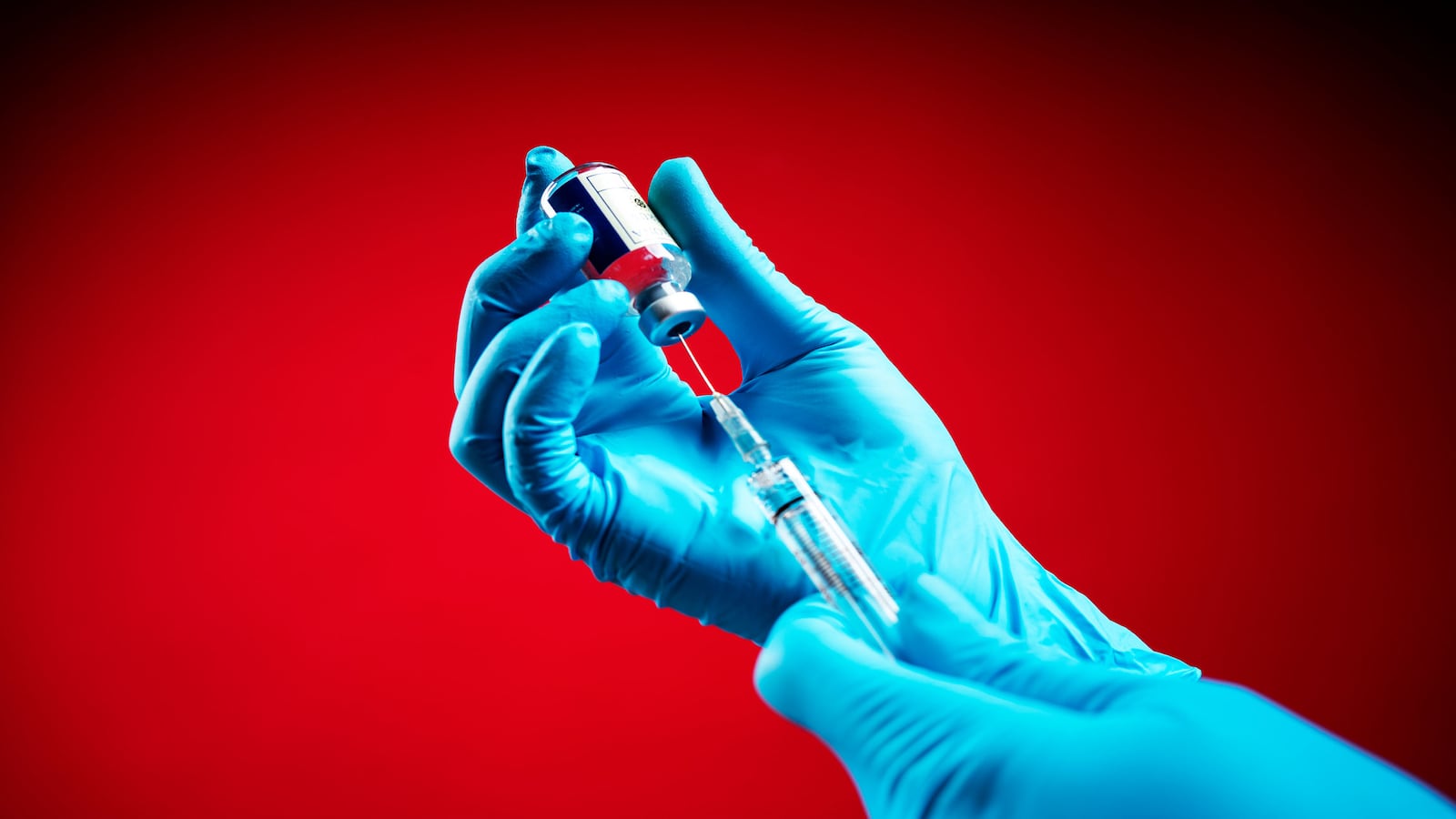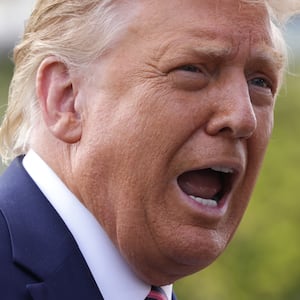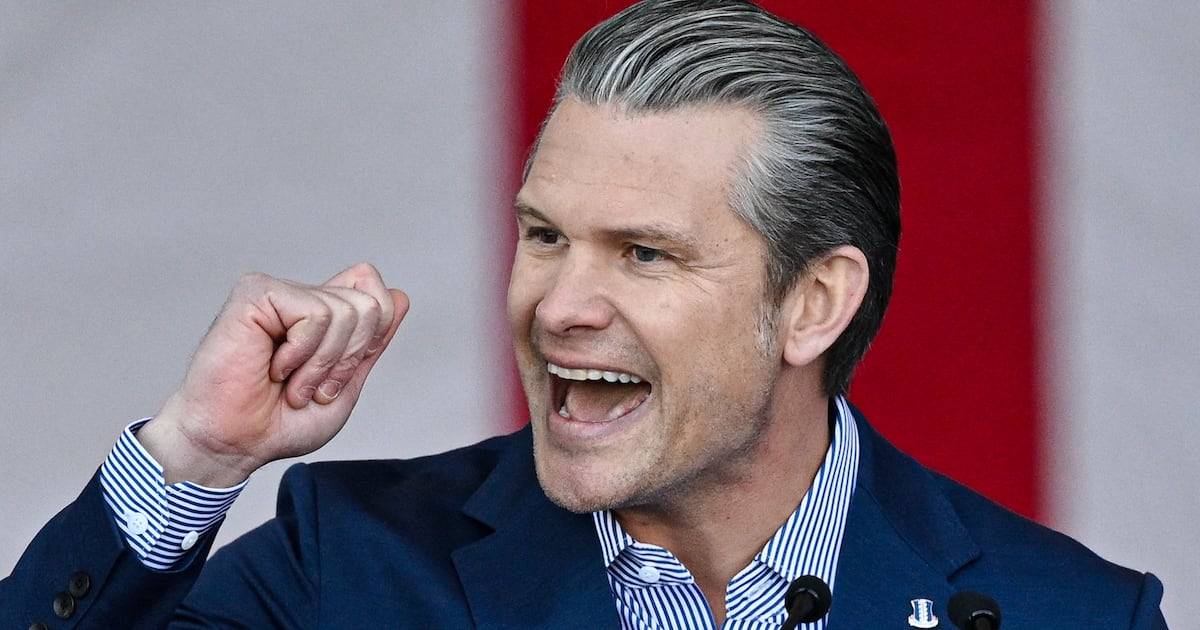If the Trump administration’s desperation for a novel coronavirus vaccine has never been more obvious, public health experts have never been more worried about just how much damage could be done by a premature rollout in the face of a relentless pandemic. In the short term, an insufficiently tested vaccine could make a lot of Americans sick. In the longer term, it could further undermine public confidence in life-saving inoculations, launching pre-existing anti-vaxxer sentiment into a dangerous new mainstream.
“There is a real risk of a catastrophic effect harming large numbers of individuals who get the COVID-19 vaccine,” Lawrence Gostin, a Georgetown University global health expert, told The Daily Beast.
Welcome to Rabbit Hole, where we dive deep on the biggest story. It’s for Beast Inside members only. Join up today.
Last week, Alex Azar, Trump’s secretary of health and human services, signed a memo barring the U.S. Food and Drug Administration (FDA) and other health agencies from approving any new rules regarding medicine, medical devices, and vaccines. Instead, sole authority to sign off on these products now lies with Azar, a Trump appointee.
Peter Lurie, president of the Washington, D.C.-based Center for Science in the Public Interest and a former associate commissioner of the FDA, told The New York Times the change amounted to “a power grab.”
Azar’s bulletin was just the latest sign that the administration might be planning a big, and possibly premature, move on vaccines.
President Donald Trump for weeks has claimed a COVID-19 vaccine could be ready before the presidential election on Nov. 3. Never mind that the leading vaccine candidates entered large-scale phase 3 trials in July or August—and could require several more months of testing before they can meet the normal federal standards for widespread use.
U.S. health authorities have long said that it could be the end of the year or later before the FDA can fully approve a vaccine. It could take months longer to actually vaccinate large numbers of people, as even Trump himself seemed to concede on Friday.
But there have been worrying signs that administration officials are bending the rules to get Trump his pre-election vaccine. “There’s been a lot of political pressure on our health agencies to do things that are questionable,” Kawsar Talaat, a doctor of infectious diseases at Johns Hopkins Bloomberg School of Public Health, told The Daily Beast.
In late August, U.S. Centers for Disease Control and Prevention (CDC) director Robert Redfield sent a letter to governors "urgently" asking them to expedite applications for vaccine distribution facilities and waive any requirements that might prevent them from being “fully operational" by Nov. 1. Around the same time, FDA Commissioner Stephen Hahn told the Financial Times he was willing to consider granting emergency use authorization (EUA) for a vaccine before phase-three trials were done.
Hahn quickly walked back his statement. “One of the agency’s highest priorities is ensuring the quality, safety and effectiveness of vaccines,” he tweeted on Sept. 11. “This deep and abiding commitment is something that we consider essential to engendering the public’s trust in vaccines.”
But the administration’s own moves, including Azar’s memo, appear to belie Hahn’s assertion.
Since this summer, the FDA has been regularly updating its vaccine-development guidelines, making it easier for the pharmaceutical industry to declare a vaccine safe and effective—even when it’s still largely untested, critics say.
The FDA’s baseline emergency use guidelines for all medical devices, drugs and vaccines date to 2017. But the FDA also issues specific guidance to vaccine-developers “with recommendations regarding the data and information needed,” the administration has stated. Those specific guidelines tell a particular pharma how much testing it must do before it can ask the FDA for permission to begin administering a vaccine on an emergency basis.
At least one vaccine-maker, New York-based Pfizer, has signaled a desire to move faster than some public health experts think is realistic. Albert Bourla, Pfizer’s CEO, said his company could know by the end of October whether its vaccine works. If the FDA swiftly approved the Pfizer vaccine, it could be distributed in the United States starting before the end of the year, Bourla said.
Pfizer “will not cut corners,” company spokesperson Jessica Smith told The Daily Beast. “Patient safety is our highest priority, and Pfizer will not bring a vaccine to market without adequate evidence of safety and efficacy.” Indeed, the company joined a slew of other big pharmaceutical players in issuing a joint statement last week that they would “stand with science” and not rush a vaccine out prematurely.
When reached for comment, a spokesperson for the Department of Health and Human Services referred The Daily Beast to the FDA, which in turn directed us to the administration’s previous public statements on vaccines and the novel coronavirus.
But the FDA’s guidelines could allow Pfizer—or any other pharmaceutical company—to declare its vaccine “safe and effective” without a whole lot of actual testing, assuming the government came along for the ride, skeptics warn. Pfizer began phase 3 trials of its vaccine, one of six receiving major financial backing from Operation Warp Speed, the U.S. government’s $13-billion vaccine accelerator, in late July. Company researchers quickly enrolled more than 30,000 test subjects.
The FDA’s basic guidelines for “emergency use authorization” of a new drug require the drug’s maker to prove simply that it “may be effective” before deploying it to certain special groups such as health-care workers or the elderly.
According to Eric Topol, director of the Scripps Research Translational Institute in California, specific federal guidance to Pfizer allows the company to declare its vaccine safe and effective after a detailed analysis of just 32 infections among its tens of thousands of test subjects. Pfizer declined to comment on the guidance.
Thirty-two cases is way too few to justify emergency use, Topol tweeted. “The EUA criteria are so minimal that even the phase-one/two serology data ... could fulfill [the] ‘may be effective’ [standard].”
Topol likened any vaccine that might get emergency FDA approval after analysis of just 32 infections to Sputnik V, the mostly untested vaccine that the Russian government rushed out early in the pandemic.
There are no clear indications yet that Sputnik V has made anyone sick. But there are also no indications that it offers lasting protection against the coronavirus. Russian doctors have reportedly been reluctant to administer the vaccine, and the general public in Russia seems equally reluctant to ask for it.
If, in the coming weeks, Pfizer or another vaccine-maker seeks emergency approval for a vaccine and the Trump administration grants it, the risks are very real.
That’s not just theory. Earlier this month, government regulators in the United States and the United Kingdom ordered U.K.-based pharma AstraZeneca to pause development of its own coronavirus vaccine candidate after a test subject in the U.K. suffered spinal inflammation. AstraZeneca’s trials remain on hold in the U.S. as investigators try to determine if the patient’s illness was related to the vaccine.
Now imagine potentially hundreds of thousands of people getting an untested vaccine. More terrifying, imagine potentially hundreds of thousands of vulnerable people getting an untested vaccine.
David Ostrov, a professor in the Department of Pathology, Immunology, and Laboratory Medicine at the University of Florida College of Medicine, told The Daily Beast a rushed vaccine could produce “adverse events ranging from mild to severe.” Moreover, the same hurried vaccine might offer “no effective protection from infection by SARS-CoV-2,” he added, referring to the virus that causes COVID-19.
The whole point of an emergency use authorization is to rush a new drug to the people who need it most. In the case of the coronavirus, that means the elderly. People between the ages of 65 and 74 are 90 times more likely to die of COVID than people ages 18 to 29, according to the CDC. People over 85 are a staggering 630 times more likely to die.
But many of the phase-thre vaccine trials, including Pfizer’s, have enrolled mostly young and healthy test subjects. If the FDA approves a vaccine for emergency use, it could be before industry has tested that same vaccine on the kinds of people who are likely to receive the vaccine first, Irwin Redlener, the founding director of Columbia University’s National Center for Disaster Preparedness, told The Daily Beast. “That’s a hell of an experiment to do,” he said.
Longer-term, a botched vaccine roll-out could turn countless Americans into anti-vaxxers, Redlener warned. Not only could they reject a coronavirus vaccine, they might also refuse to get flu vaccines or inoculate their kids against a host of potentially fatal childhood diseases.
“The anti-vax movement, which was strong to begin with, is going to get increasingly reinforced,” Redlener said.
As we barrel toward an election and the eventual deployment of one or more vaccines, it’s fair to say the credibility of the whole federal health bureaucracy is at stake. And that credibility is getting shakier by the day.
The National Medical Association, a Maryland-based group of Black doctors, recently announced it would create its own committees for independently vetting any vaccines the FDA approves. “There is a concern that some of the recent decisions by the Food and Drug Administration have been unduly influenced by politicians,” Leon McDougle, the group’s president, told StatNews.
Of course, some health experts remain confident that HHS, and the agencies it oversees like the FDA, the CDC, and the National Institute of Allergy and Infectious Diseases (NIAID), will ultimately will do what’s best for the public, and deploy a coronavirus vaccine only after it’s thoroughly tested. “Tony Fauci is not going to let an unsafe and ineffective vaccine get out,” said Paul Offit, director of the Vaccine Education Center at the Children’s Hospital of Philadelphia, referring to NIAID’s embattled director.
Last week, Fauci told MSNBCs Chris Hayes he would "take the heat" if the government ends up approving a faulty vaccine.
But even if the U.S. health establishment does ultimately balk at releasing an untested vaccine, the administration’s moves may already have already caused lasting damage. Prominent Democrats have expressed skepticism of taking a vaccine, even if it’s approved. A once sacrosanct process has been compromised.
“The public’s trust has been incredibly eroded,” Talaat said.
There’s just one way to begin repairing that damage, she added, even if it is a lofty goal.
“We need to get politics out of science.”







